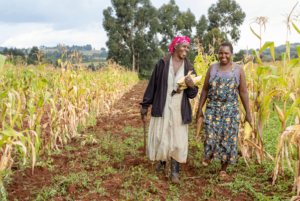Growing prosperity and building climate resilience for small-scale farmers

The challenge: African small-scale farmers are vulnerable to a range of climate-related stressors
Average global temperatures are projected to rise by 2.1–3.5 °C, according to the latest IPCC report which is well above the 1.5–2 °C limit laid out by the signatories of the 2015 Paris climate agreement. In the latest assessment (IPCC Sixth Assessment Report), the IPCC has stated with high confidence that ‘climate change has caused negative impacts on crop yields and crop quality’.
Each growing season has its own particular set of challenges, but with climate change, farmers are now faced by an additional growing source of insecurity. The two main threats related to climate change are:
- Extreme weather conditions and higher temperatures: Farmers in Sub-Saharan Africa are particularly vulnerable, in part because a significant majority rely on rain-fed agriculture instead of irrigation. In Kenya, there are typically two rainy seasons: The long rains which are typically from March to May, and the short rains from October to December. Rising temperatures and shifting weather patterns are causing more extreme weather events, such as drought or floods, and transforming conditions for small-scale farmers.
- Pests and diseases: Changes in temperatures and moisture conditions allow crop diseases and pests to migrate into new areas – in the past few weeks alone, Kenya has witnessed the spread of fall armyworms, an invasive caterpillar that devastates maize and sorghum fields.
At a time when growing conditions are changing rapidly from year to year, the speed at which we implement adaptation strategies is crucial. If small-scale farmers are forced to rely on farming methods and crop varieties that are decades old, their chances of successfully adapting to the new conditions created by climate change will be limited from the start.
74% of Apollo’s farmers said that their community experienced at least one climate-related shock in the last 24 months – the urgency to act now could not be greater*
At a time when growing conditions are changing rapidly from year to year, the speed at which we implement adaptation strategies is crucial. If small-scale farmers are forced to rely on farming methods and crop varieties that are decades old, their chances of successfully adapting to the new conditions created by climate change will be limited from the start.
The path forward
Against this backdrop and pressing urgency, the limited financial resources of small-scale farming households impose severe constraints on rapid adoption of new farming practices. At Apollo Agriculture, we are working hard to make climate-resilient farming methods accessible and commercially viable while also empowering farmers to develop additional economic resilience to climate-related shocks. We leverage machine learning and automated operations technology to provide the financing and products small-scale farmers need to increase their production, profitability, and resilience to climate change.

Since 2017, Apollo has partnered with the Shell Foundation, co-funded by UK Aid from the UK Government to introduce innovative products to its farmers. With the continuing support of its partners, Apollo has gained valuable insights on building a scalable and financially sustainable model for serving small scale farmers and embedding adaptation in the model by:
- Using world-class tech, operations, and embedded financing, to serve small-scale farmers in a fundamentally more scalable and financially sustainable manner. As one of Apollo’s customers commented: “I have acquired assets for my farming business without investing much of my own capital. This has been a reprieve, taking into consideration the economic challenges we face plus the impact of Covid-19”.
- Providing quality farm inputs and agricultural training which help improve crop yields, and income. As an Apollo customer stated: “My income increased greatly as I harvested 20 bags of maize compared to 10 bags before Apollo Agriculture. We also have plenty of food to eat”*. Of the farmers interviewed in the 60DB survey, 83% of farmers reported an improved way of farming.
- Empowering farmers to adopt climate resilient farming practices. More than 8 in 10 farmers report improvement in their farming practices because of Apollo Agriculture. including:
-
- Drought-resistant seed varieties and blended fertilisers which can help reduce soil acidification and increase yields
- Intercropping systems e.g. growing maize and beans to increase biodiversity, manage pests, increase soil health and in many instances, enhance crop productivity
- The use of manure for planting which restores soil health and fertility
- Solar irrigation pumps that can make farmers more resilient to the erratic shifts in rainfall patterns caused by climate change
- Crop insurance that protects farmers from environmental perils, including pests, diseases, drought, flooding, and excessive rainfall. As one of Apollo’s customers remarked “Apollo Agriculture offers insurance services to the farmer, which was helpful to cushion me when my farm production was affected and impacted by late rains”
While these early insights and customer feedback confirm that Apollo is on the right path, we recognise that we are only at the beginning of a long journey to empower farmers in sub-Saharan Africa to become more productive and less vulnerable to climate-related risks and shocks. As we continue to grow rapidly, this will enable us to continue to trial new and innovative ideas to increase climate change resilience – and maximise our impact through broader distribution to the world’s most vulnerable populations.
*Apollo Lean Data Study 2022 carried out by 60 Decibels
















